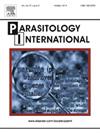非典型表现的蚓状肠虫在一个认知障碍的老年患者:1例报告
IF 1.9
4区 医学
Q3 PARASITOLOGY
引用次数: 0
摘要
蠕状肠虫感染(肠虫病)是一种常见的肠道寄生虫病,典型特征是肛周瘙痒,在儿童中最常见。在可能没有报告典型症状的认知受损个体中诊断肠道菌病是一项诊断挑战。我们报告的情况下,86岁的日本妇女认知障碍谁是承认胫骨骨折。在常规换尿布时,在她的肛周和阴道周围偶然观察到一些活动的丝状生物。镜检鉴定为妊娠雌虫。患者报告无瘙痒或失眠,并成功地治疗了吡喃吡酯的两剂量方案。随后的胶带测试证实寄生虫已被清除。该病例突出表明,老年认知障碍患者的肠道菌病在临床上可能无症状,由于潜在的卫生困难和无法报告症状,这一人群的风险增加。临床医生和护理人员应对认知障碍老年患者的肠道菌病保持警惕,以确保及时诊断和预防传播。本文章由计算机程序翻译,如有差异,请以英文原文为准。
Atypical presentation of Enterobius vermicularis in a cognitively impaired elderly patient: A case report
Enterobius vermicularis infection (enterobiasis) is a common intestinal parasitosis, typically characterized by perianal pruritus, and is most prevalent in children. Diagnosing enterobiasis in cognitively impaired individuals, who may not report typical symptoms, poses a diagnostic challenge. We report the case of an 86-year-old Japanese woman with cognitive impairment who was admitted for a tibial fracture. During a routine diaper change, several motile, thread-like organisms were incidentally observed in her perianal and perivaginal areas. Microscopic examination identified the organisms as gravid female E. vermicularis. The patient reported no pruritus ani or insomnia, and was successfully treated with a two-dose regimen of pyrantel pamoate. The follow-up adhesive tape tests confirmed clearance of the parasites. This case highlights that enterobiasis can be clinically silent in elderly patients with cognitive impairment, a population at increased risk due to potential difficulties with hygiene and an inability to report symptoms. Clinicians and caregivers should remain alert to enterobiasis in cognitively impaired elderly patients to ensure timely diagnosis and prevent transmission.
求助全文
通过发布文献求助,成功后即可免费获取论文全文。
去求助
来源期刊

Parasitology International
医学-寄生虫学
CiteScore
4.00
自引率
10.50%
发文量
140
审稿时长
61 days
期刊介绍:
Parasitology International provides a medium for rapid, carefully reviewed publications in the field of human and animal parasitology. Original papers, rapid communications, and original case reports from all geographical areas and covering all parasitological disciplines, including structure, immunology, cell biology, biochemistry, molecular biology, and systematics, may be submitted. Reviews on recent developments are invited regularly, but suggestions in this respect are welcome. Letters to the Editor commenting on any aspect of the Journal are also welcome.
 求助内容:
求助内容: 应助结果提醒方式:
应助结果提醒方式:


